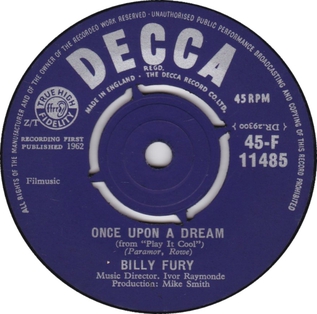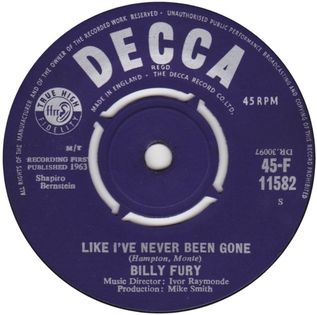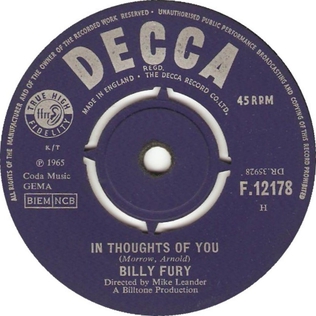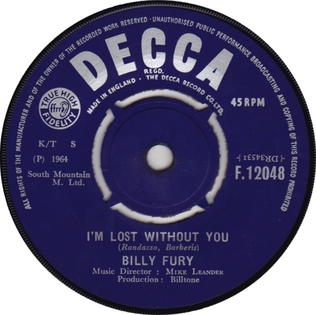The Tornados were an English instrumental rock group of the 1960s that acted as backing group for many of record producer Joe Meek's productions and also for singer Billy Fury. They enjoyed several chart hits in their own right, including the UK and U.S. No. 1 "Telstar", the first U.S. No. 1 single by a British group. Today Dave Watts has his own version.

Ronald Wycherley, better known as Billy Fury, was an English singer, musician, songwriter, and actor. An early star of rock and roll, he equalled the Beatles' record of 24 hits in the 1960s and spent 332 weeks on the UK chart. His hit singles include "Wondrous Place", "Halfway to Paradise" and "Jealousy". Fury also maintained a film career, notably playing rock performers in Play It Cool in 1962 and That'll Be the Day in 1973.

Georgie Fame is an English R&B and jazz musician. Fame, who had a string of 1960s hits, is still performing, often working with contemporaries such as Alan Price, Van Morrison and Bill Wyman. Fame is the only British music act to have achieved three number one hits with his only Top 10 chart entries: "Yeh, Yeh" in 1964, "Get Away", in 1966 and "The Ballad of Bonnie and Clyde" in 1967.

Marty Wilde, is an English singer and songwriter. He was among the first generation of British pop stars to emulate American rock and roll, scoring several 1950s hit singles including "Endless Sleep", "Sea of Love" and "Bad Boy". During the 1960s and 1970s, Wilde continued to record and, with Ronnie Scott, co-wrote hit singles for others including the Casuals' "Jesamine" and Status Quo's "Ice in the Sun". He is the father of pop singer Kim Wilde and co-wrote many of her hit singles including "Kids in America" with his son Ricky. He continues to perform and record.
The Vernons Girls were an English musical ensemble of female vocalists. They were formed at the Vernons football pools company in the 1950s in Liverpool, settling down to a sixteen strong choir and recording an album of standards.

"Halfway to Paradise" is a popular song written by Carole King and Gerry Goffin. In the United States, the song was originally recorded in 1961 by Tony Orlando where it peaked at No. 39 on the Hot 100. In Canada, the song reached No. 3 in the CHUM Charts.
Dickie Pride was an English singer. He was one of Larry Parnes' stable of pop music stars, who did not achieve the same successful career as some of his contemporaries.

Vince Eager is an English pop singer. He was widely promoted by impresario Larry Parnes, but later quarrelled with him over his commercialising of Eddie Cochran's tragic early death. Eager has since appeared in cabaret and on the West End stage.

"Colette" is a song by English rock and roll singer Billy Fury, released as a single in January 1960. It peaked at number 9 on the Record Retailer Top 50, becoming Fury's first top-ten hit.

"I'd Never Find Another You" is a song written by Gerry Goffin and Carole King and first released by American singer Tony Orlando on his album Bless You and 11 Other Great Hits in September 1961.

"Last Night Was Made for Love" is a song by English singer Billy Fury, released as a single in April 1962. It peaked at number 4 on the Record Retailer Top 50.

"Once Upon a Dream" is a song by English singer Billy Fury, released as a single in July 1962. It peaked at number 7 on the Record Retailer Top 50.

"Like I've Never Been Gone" is a song written by Paul Hampton and Camille Monte and first released by American country singer Chase Webster in July 1962. In February 1963, English singer Billy Fury released a cover of the song which peaked at number 3 on the Record Retailer Top 50.

"When Will You Say I Love You" is a song by English singer Billy Fury, released as a single in May 1963. It peaked at number 3 on the Record Retailer Top 50.
"Because of Love" is a song by Elvis Presley, released on his soundtrack album Girls! Girls! Girls! in November 1962.

"In Summer" is a song by English singer Billy Fury, released as a single in July 1963. It peaked at number 5 on the Record Retailer Top 50.

"Do You Really Love Me Too" is a song written by Mark Barkan and Ben Raleigh and first released by American pop singer Barbara Chandler as the flip side to "I Live to Love" in October 1963. Originally called "Fool's Errand", it was renamed "Do You Really Love Me Too" on the UK release of the single in December 1963.

"In Thoughts of You" is a song by English singer Billy Fury released as a single in June 1965. It peaked at number 9 on the Record Retailer Top 50, becoming Fury's final top-ten single.

"Lost Without You" is a song written by American songwriters Teddy Randazzo and Billy Barberis and first released by Randazzo as a single in September 1964. It was not as successful as some of his previous releases, only peaking at number 130 on the Billboard Bubbling Under the Hot 100. The song had more success in the UK after it was covered by English singer Billy Fury, who released his version titled "I'm Lost Without You".

"Letter Full of Tears" is a song written by American singer-songwriter Don Covay and released by Gladys Knight & the Pips as a single in November 1961. It became their second top-20 hit, peaking at number 19 on the Billboard Hot 100. The song was covered the following year by English singer Billy Fury who had a minor hit with it.
















